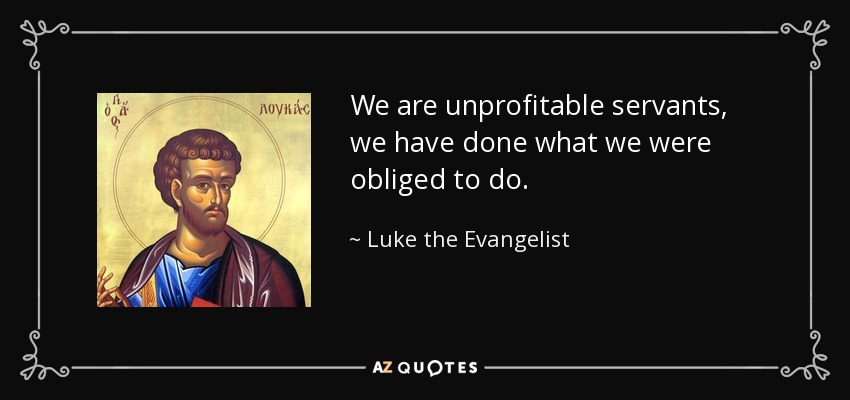- Luke 17:7-10
By nature, we are inclined to compare our morality to that of others. It is similar to that joke about escaping bears: I don't have to be faster than the bear; I just have to be faster than you! Our moral standing in our own eyes isn't according to an objective standard, i.e., the moral Law of God, but rather to a relative standard of better or worse (according to our own estimation) than those around us. Yet, no one ever seems to question how everyone can be more moral than average. Doesn't an average imply that fifty percent of the population is below that level?
This has led in theology to the Roman doctrine of supererogation, according to which some especially-holy people have so exceeded God's moral requirements that they can apply that surplus to others less worthy. Thus, the Catholic adoration of saints.
Jesus disposes of that doctrine in the passage above. Even if a person were to live perfectly, he is only doing what is expected of him, and earns no accolades. He is an unprofitable servant, because he doesn't go beyond the minimum expectation. If the best we can hypothetically do is to scrape by at the bare minimum, then logically there can be no credit for extra good works to beg from so-called saints. The adoration of the saints is exposed as nothing more than vain superstition.
However, even this minimum standard is only hypothetical. Since we have all fallen in our father Adam, Romans 5:12, all our actions are contaminated. Isaiah 64:6 says, "We have all become like one unclean, and all our righteous deeds are like a polluted garment. We all fade like a leaf, and our iniquities, like the wind, take us away." If our best works are only filthy rags in the sight of God, then none of us can claim to have even met the minimum requirement. We are worse than unprofitable servants!
Isaiah 59:2 warns us about the impact of our works on our relationship with God: "Your iniquities have made a separation between you and your God, and your sins have hidden His face from you so that He does not hear." Our righteous deeds have been like throwing garbage in the face of God, and their stench has driven him away from us. However, in His mercy, God Himself gave the solution for bridging that gap, though it is our actions, not His, that have created it.
Isaiah again explains, in 53:4-6: "Surely He has borne our griefs and carried our sorrows; yet we esteemed Him stricken, smitten by God, and afflicted. But He was wounded for our transgressions; He was crushed for our iniquities; upon Him was the chastisement that brought us peace, and with His stripes we are healed. All we like sheep have gone astray; we have turned every one to his own way; and the Lord has laid on Him the iniquity of us all."
If you look to your own good works, then you are separated from a holy God. If you look to the works of a so-called saint, then your hope will be found to be a deception. It is only in the cross of Christ that our fellowship with God can be restored. The Apostle Paul, in Romans 10:9-10, 13, gives us God's promise: "If you confess with your mouth that Jesus is Lord and believe in your heart that God raised Him from the dead, you will be saved, for with the heart one believes and is justified, and with the mouth one confesses and is saved... For everyone who calls on the name of the Lord will be saved."





No comments:
Post a Comment